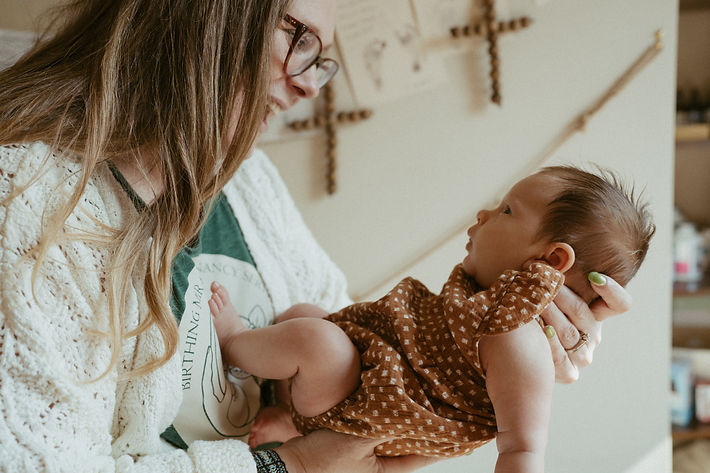Exploring the Uncertainty of Fear in Home Birth: A Different Perspective
- Joey Larson
- Feb 27, 2025
- 4 min read
The decision to have a home birth brings a whirlwind of emotions for expecting parents. Among them, fear often emerges as a central concern. Understanding fear in the home birth context can help individuals navigate their feelings and contribute to a more empowering birthing experience.
Fear is a natural human response, especially when facing the unknown. In the realm of home birth, this fear can stem from various sources, including personal beliefs, societal expectations, and the uncertainties of childbirth itself. Recognizing these fears is crucial, but it is equally important to explore their roots and identify strategies to manage them effectively.
The Roots of Fear in Home Birth
Understanding the origins of fear is vital in addressing it. Expecting parents may worry about their baby’s health, the availability of support during labor, or even their capabilities as parents.
Many societal narratives elevate hospital births as the safer option, which can amplify fears surrounding home births. Additionally, personal experiences or stories shared by others often heighten these anxieties. For example, statistics show that 53% of first-time mothers worry more about complications at home than in a clinical setting.
Combating fear with knowledge is essential. Research indicates that when conducted by skilled professionals, home births are generally safe. A study published in the British Medical Journal found that planned home births had similar outcomes to hospital births for low-risk women, showcasing positive results that can help ease concerns.
Managing Fear Through Education
Education is a powerful tool to combat fear. Understanding the physiological processes of labor and delivery can empower expectant parents. For instance, many find that attending childbirth classes—whether in-person or online—can significantly alleviate anxiety associated with home birth. These classes often highlight not only the mechanics of childbirth but also the emotional preparedness needed for this significant experience.
Moreover, discussions with healthcare providers can clarify fears about potential complications and emergency scenarios. Knowing the signs of labor progression and having a clear plan can boost confidence. Research shows that 72% of parents who discuss their birth plans with their caregivers feel more prepared and manage their fears better.
Engaging in supportive conversations with partners is equally important. When both partners understand expectations and realities, they can better support each other during labor, which can help manage fear collectively.
Building a Support System
A strong support system is crucial to reducing fear during home birth. This includes selecting a skilled midwife or doula who aligns with your birthing vision. Having a knowledgeable birth team can provide reassurance and answer questions throughout the process.
Involving family members or close friends can also alleviate fear. The presence of loved ones creates a safe and supportive environment that can make managing fears feel less daunting. For instance, studies have shown that 81% of women who had supportive partners reported more positive birth experiences.
Additionally, crafting a birth plan can help align expectations among all parties. A birth plan serves as a reminder of your preferences and the supportive atmosphere you want to establish.
Preparation and Mindfulness
Both physical and mental preparation play crucial roles in the birthing experience. Practicing relaxation techniques, breathing exercises, or mindfulness strategies can effectively manage fear and anxiety. Research indicates that mothers who practiced mindfulness reported a 30% reduction in anxiety during labor.
Visualizing the birth process can also help. Envisioning a peaceful setting and a smooth progression can shift focus from fear to anticipation.
Creating a comfortable environment at home—such as using dim lighting, soothing music, or comforting scents from essential oils—further personalizes the experience and helps reduce anxiety.
The Role of Health Care Providers
Working with skilled midwives or healthcare professionals experienced in home births boosts confidence levels for expecting parents. Knowing that trained professionals are present can alleviate many fears associated with home birth.
It’s crucial to ensure that your chosen provider understands your vision and communicates their approach clearly. This alignment fosters trust and security. Engaging in open conversations about fears can result in tailored advice and reassuring support.
Embracing the Unknown
Fear often revolves around the unknown, a natural part of childbirth. While it may not be possible to eliminate fear entirely, embracing uncertainty can lead to positive outcomes. Accepting that unexpected changes can occur and being open to adapting plans can offer peace of mind.
Focusing on resilience—both in birthing and the parenting journey—can help shift perspectives. Many parents share that their greatest fears became trivial compared to the joy of their newborn’s arrival. For example, surveys show that 90% of parents feel more empowered after navigating their home birthing experience.
Final Thoughts
Navigating the fear associated with home birth is a meaningful journey for many expecting parents. By acknowledging fears and focusing on education, support systems, and mental preparation strategies, individuals can shift from a place of uncertainty to one of empowerment.
Creating a safe environment, both physically and emotionally, is vital to how fear influences the home birth experience. By fostering knowledge and resilience, parents can embrace the unknown while celebrating the miracle of life.
Every home birth journey is unique. Recognizing this individuality allows for a deeper understanding of personal fears and opens pathways to overcome them, leading toward a fulfilling experience that celebrates new life.






Comments